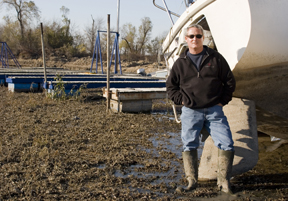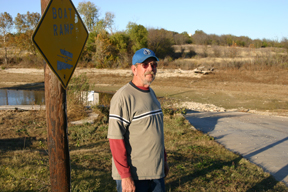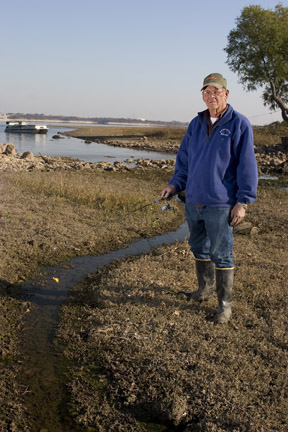Off Old Granbury Road in Southwest Fort Worth, a sign with the message “marina for sale” leads to the sad-looking shores of Benbrook Lake. Stay on the dirt road, past roaming cattle and a trash pile heaped with old furniture, and you’ll come to the marina in question.There are no boats left in the water at Rocky Creek Marina – because there is precious little water. A few boats are still kept in dry storage. A fishing barge has been pulled up on shore, and the boat ramp no longer reaches the water. In good weather there are occasionally groups of picnickers at the wooden tables set here and there on concrete pads amid the yellowed grass, but a covered pavilion to one side of the marina office looks like it hasn’t seen a band in a while.
 Johnny McDaniel built most of the marina’s amenities himself – the picnic tables, the pavilion, the barge, the boat ramp – back in 1996 when he bought the business, and for years it provided him with a nice income. Boaters, fishermen, and water lovers of various sorts came to Benbrook throughout the year. Back then, he had to show his plan for the business to the Corps, which owns and operates the lake, dam, and surrounding property (including the marina’s 30 acres), before the agency would approve his purchase.
Johnny McDaniel built most of the marina’s amenities himself – the picnic tables, the pavilion, the barge, the boat ramp – back in 1996 when he bought the business, and for years it provided him with a nice income. Boaters, fishermen, and water lovers of various sorts came to Benbrook throughout the year. Back then, he had to show his plan for the business to the Corps, which owns and operates the lake, dam, and surrounding property (including the marina’s 30 acres), before the agency would approve his purchase.
The Corps didn’t have to show its hand to McDaniel, however. Several years before McDaniel bought the marina, the Corps had signed a contract that, in combination with a long-running drought across North Texas and the Southwest, would gradually drain much of the water out of Benbrook Lake. Along with the water went the profit potential for McDaniel’s marina and another like it across the lake, as well as bait shops and other lake-related businesses.
Dana Boyd has fished at Benbrook Lake since 1960. He used to fish off the Rocky Creek Marina barge two or three times a week and put his boat in at other times. He said water fluctuations play havoc with fishing. “When the water goes down, the fish go away, and it’s going to take months for them to decide to come back in there. They go and establish their home somewhere else.”
Now, he said, “I haven’t been out there in a while, since the Corps screwed up and sold all that water.”
The water wasn’t stolen in the night, though some folks who live nearby have all sorts of conspiracy theories about what happened. It’s basically gone to supply the water needs of a Tarrant County population that’s growing faster than algae in a fish tank. But in the process, a lake that had been a major spot for water sports and recreation in southwest Tarrant County – the key asset for surrounding parks, bike trails, and bridle paths, popular with fishermen and boaters for half a century – has shrunk to a fraction of its former size. For most of the year, its waterline is well below what once was considered normal. It has dropped as much as 14 feet, with large stretches completely dry and much of the rest reduced to a shallow, stump-littered puddle.
“It’s not even the same lake,” said Boyd. “People used to like to go out on their boats and over by the swimming beach. You can’t go out there and just fish anymore; there are some places you just can’t get to.”
Benbrook Lake, one of many artificial lakes created during the nationwide public- works boom after World War II, was built primarily to help control the deadly floods along the West and Clear Forks of the Trinity River that devastated much of the West Side of Fort Worth in the 1930s and 1940s. The huge 1949 flood, which sent waters as high as the second floor of the Montgomery Ward building on 7th Street, happened just as the Benbrook dam was being built. Since then, the lake’s water- storage ability  has helped prevent major downstream flooding many times.
has helped prevent major downstream flooding many times.
The lake is by far the biggest recreational area in Benbrook. Nine parks, dozens of campsites, trails, and swimming beaches ring the lake. Bikers, horse riders, hunters, and fishermen depend on its surrounding greenspace for recreation.
But in 1991, the character of the lake underwent a major change. That year, the Corps signed a 30-year water sales contract with the Tarrant Regional Water District. In 1998, the water district finished construction of a pump station, and a year later the water levels started going down, as Benbrook joined the list of lakes all over North Texas – and as far away as Richland Chambers Reservoir, southeast of Corsicana – that help supply the water needs of residents in an 10-county area.
The contract allows the district to take out enough water to lower the lake levels by 29 feet. According to the Corps, the lake hit its lowest level ever in November 2005 – 14 feet below normal.
The combination of a two-decade-long drought and ever-sprawling suburbs hasn’t helped matters. According to the Texas Water Development Board, the area isn’t officially in a drought at the moment, but overall rainfall in the state has been dwindling since 1996. At the same time, the water district said its customer load has increased to 1.7 million users, a total that’s expected to triple by 2060.
Unfortunately for boaters and marina owners at Benbrook, the most cost-effective way for the water district to manage its water supply is via a strategy that hits Benbrook hardest in the summer, when the water is needed most for recreation. TRWD uses Benbrook as a sort of local water “bank”: It pumps water up to Lake Benbrook from Richland Chambers in the winter. Then, during peak-usage months in the summer, it draws on the supply stored at Benbrook to meet the water needs of Fort Worth and other customers. The district does most of its pumping from East Texas during the winter, because electricity to run the pumps costs much less then.
As the Corps’ web site explains, “This brought Benbrook Lake to record low summer pool levels and has had great impacts on summer recreation.”
The district’s practice is to have Benbrook Lake filled near conservation – or normal – levels by June. Unfortunately for the marina owners and lake lovers, the peak water-usage season starts around July, so the lake, in recent years, has been at its normal level only for the first month of the summer season.
When water levels get low in any popular lake, the folks who use it start wondering – especially when some lakes seem to suffer more than others – whether somebody else is getting their share of the water jug. Around Benbrook, one of the rumors was that Benbrook lake levels were being sacrificed each summer in order to keep Eagle Mountain Lake filled.
It’s true that Benbrook is part of the TRWD pipeline system that also includes Eagle Mountain, on the West Fork of the Trinity. But a water district official explained that it just doesn’t work that way. Chad Lorance, communications manager for TRWD, said that Benbrook and Eagle Mountain are indeed connected to the same pipeline that brings water to the Fort Worth area from East Texas, but that no water is transferred from Benbrook to the larger lake on the north side of Fort Worth.
“The pipeline is kind of like a freeway coming from East Texas from Richland Chambers and Cedar Creek reservoirs; they come together and run parallel to I-20,” he said. “Then there’s an ‘exit ramp’ where we put water into Arlington, then it goes to Benbrook. Now we’ve added an exit ramp that goes to Eagle Mountain. We’re able to supplement our water supply for the growing Metroplex from East Texas.” Each year, he said, district officials evaluate how much water needs to be pumped where.
The result is rather like what happened when interstate freeways were built that routed traffic around small towns. The towns dried up, and so has Benbrook. Currently, the Corps web site shows that all but two boat ramps on the lake are closed due to low water.
Fishing, swimming, boating, and the other recreational aspects of the lake are not taken into consideration when the district decides how much water to pump out of East Texas and into Benbrook Lake, Lorance said.
“We appreciate the recreation that goes on at our lakes, but really the water supply is what we’re looking at.”
 Across the lake from Rocky Creek, Ron Rogers and his business partner Kayla Stidham are also struggling with his Benbrook Marina. He said that, when he purchased his marina in October 2007, the water levels were significantly higher than now – and that a former business partner assured him that the Corps wouldn’t let the water drop more than four or five feet below normal levels. But by July of this year, Rogers said, the water was down by about 10 feet.
Across the lake from Rocky Creek, Ron Rogers and his business partner Kayla Stidham are also struggling with his Benbrook Marina. He said that, when he purchased his marina in October 2007, the water levels were significantly higher than now – and that a former business partner assured him that the Corps wouldn’t let the water drop more than four or five feet below normal levels. But by July of this year, Rogers said, the water was down by about 10 feet.
Bob Faucet, the lake’s manager for the Army Corps of Engineers, said that there were no guarantees given to the marina operators concerning water levels.
“We’ve lost probably $25,000 a month in revenue [since July],” Rogers said. “People kept coming out, hoping the water would come back, but after a month they stopped.”
Regardless of the conditions, he and his partner are in it for the long haul, Rogers said. They are planning, at great cost, to lower the elevation of the marina and dig a trench to the deep part of the lake, in order to funnel water to the marina.
“We have so much money invested in the thing, we just have to keep throwing money at it,” he said. “We want to make this place a Taj Mahal. We want to bring those people down from Mira Vista.”
The TRWD timetable leaves only a narrow window in which Benbrook marinas can operate with any hope of making a profit. The marinas depend on good weather and decent water levels, making the bulk of their money through fees for boat storage, both dry and in the water. They also operate concession stands, sell groceries, and charge fees to fish, picnic, or camp.
When Rogers bought Benbrook Marina, it was in shambles. No repairs or maintenance had been done for several years. Rogers, whose background is in construction, restored the place in short order, and boaters and fishermen started coming back. In fact, there was a waiting list for his in-water boat-storage facilities. He had filled his 150 “wet slips” by the time the TRWD pulled the plug in July.
“By August, I was pulling every boat out of here by hand because it was too shallow,” he said.
 Desperate, Rogers set out to dredge the lake, but the Corps, the water district, and the City of Benbrook all refused to help him. He went ahead, spending $70,000 of his own money before stopping due to weather and costs; he figures it would have taken another $150,000 to finish the job. Besides what he spent on the dredging and improvements, he said, he and his partner have lost more than $100,000 in revenue over the last few months.
Desperate, Rogers set out to dredge the lake, but the Corps, the water district, and the City of Benbrook all refused to help him. He went ahead, spending $70,000 of his own money before stopping due to weather and costs; he figures it would have taken another $150,000 to finish the job. Besides what he spent on the dredging and improvements, he said, he and his partner have lost more than $100,000 in revenue over the last few months.
Rogers rents the marina from the City of Benbrook, which in turn leases the land from the Corps. He said the Corps has tried to help, but he’s gotten not even sympathy from the city.
“The Corps has made efforts to help us,” he said. “The city basically has their hand out every month for their check, and every time we ask for assistance, they say, ‘We can’t help you.’ “
In an attempt to lure boaters back, Rogers started using another boat ramp, since his own, like McDaniel’s, no longer reaches the water’s edge. The usable ramp was near an abandoned property, formerly occupied by Baja Beach, a one-time privately run swimming area that went out of business. The city keeps the area locked but sells keys for $25 to local citizens who want to fish that area. So Rogers bought a key and proceeded to clean and repair the long-neglected ramp. He said he was told by the Corps that the ramp could be used by the public.
“I took my own personnel over there to clean it up, took a tractor over there, and made a parking area so I wouldn’t lose my customers completely,” he said.
The city waited until he had finished the repairs – and then fenced off the ramp. Rogers said that Walter Shumac, director of public services for Benbrook, told him that his use of the ramp created a liability problem because there was no one to supervise the area. Rogers checked with his insurance agent, who told him the ramp was in fact covered by his insurance.
Shumac told Fort Worth Weekly that the city had to close the ramp because the city didn’t patrol that area of the lake – in other words, directly because of the business that Rogers had attracted. Shumac said he had no knowledge of any repairs until they were already completed.
“We started having a lot of people wanting to use the ramp,” he said. “We got into a situation where a lot of people were in an area that the city doesn’t regulate. We don’t have patrols, and we haven’t looked at the condition of that ramp.” He said the ramp issue exacerbated other problems: “It’s such an isolated area; when people go back there, they want to do things they have no business doing.”
He also said that the city is seeking developers who might want to build other lake recreation facilities in that area but acknowledged that the low water levels will make it more difficult to court business. On the plus side, the ramp is in great condition, thanks to Rogers, though Shumac seemed less than grateful.
“Anything as far as repairs, there was never an agreement with us,” he said. “If he did that, it was done at his own expense; no one asked him to do that.”
Rogers’ tendency to spend first and ask permission later has caused other problems. He opened a burger shack that did well for a time. But when he put signs up just off Hwy. 377 to promote it, he foundthat they violated the city sign ordinance, and he had to take them down – another $1,000 investment now sitting in storage.
The marina owner has also clashed with the city about a creek that runs through his property. The city is in charge of it, and according to Rogers, trash from that creek washes up at the marina.
“I told the city that they need to get it all cleaned up, because the trash washes down to me,” he said. “I’ve already [filled]four dumpsters from the waste. They said, ‘We don’t have the manpower to do it,’ so they forced it onto me. I’m already having a hard time now, and they’re forcing me to clean up their mess.”
 Rogers’ story is one that McDaniel – or Johnny Mack, as he’s known to his friends – has been living for more than a decade. His boat storage facility was full at one point in 2004, but now only about 35 out of more than 100 boats are left, and he’s cannibalizing the empty parts of the building for materials to sell as scrap.
Rogers’ story is one that McDaniel – or Johnny Mack, as he’s known to his friends – has been living for more than a decade. His boat storage facility was full at one point in 2004, but now only about 35 out of more than 100 boats are left, and he’s cannibalizing the empty parts of the building for materials to sell as scrap.
The year he bought his business, it netted $60,000. Although lake levels started dropping a few years later, when TRWD began selling the water to its customers, the marina continued to thrive, open nine or 10 months of the year, with profits increasing every year through 2004, when McDaniel made $140,000. But in 2005, as the lake water circled the drain, he was able to keep the marina open for only four and a half months. The next year, amid worsening drought conditions, he was open for only three months. He hasn’t been open on Labor Day, a traditionally big day at the lake, for the last seven years because of the low water levels.
“When I bought the place 12 years ago … they didn’t tell me that they had sold the water to the water district,” he said. “They didn’t tell me, ‘By the way, it’s going to be drained out.’ They wanted me to build all this stuff – campsites, fishing barges, storage – and I built all that. Why didn’t they tell me, ‘By the way, you’re going to go broke doing this’?”
In 2005, McDaniel began to take action. He started a letter-writing campaign to elected officials – the governor, both U.S. senators from Texas, his congressman, and many others. The only response he got was from State Rep. Anna Mowery. “There is no one in the federal government who cared,” he said. “The only person who cared was Mowery, and the federal government told her to eat shit.”
Since 2005, McDaniel’s life and financial situation have followed the same path as the water level of Benbrook – continually downward. That year brought one of the worst droughts in the U.S. since the 1950s and took Benbrook down to record low water levels. The TRWD had problems on the pipeline, which made the situation even worse at Benbrook. When a young man drowned in the lake that year, emergency personnel had great difficulty launching a rescue boat because all the ramps were closed due to low water.
The number of boats in McDaniel’s storage facility is still dwindling. He makes a little money from fees for use of the camp sites and pavilion. But every year he sees fewer and fewer of his longstanding customers; many are likely gone for good.
Lewis James, who stored his boat at Rocky Creek Marina for two years, is one of those. “They drained the lake down to where it’s so shallow you can’t even put your boat in,” he said. “When you do get out there, the stumps and everything in it are so close to the surface that you tear holes in your boat.”
He used to go to the lake about four times a week until a stump damaged his boat. Now he stores it 70 miles from his home in south Arlington and uses a lot of gasoline driving it to other area lakes.
Bill Aslin, who recently sold his boat, used to go to the lake twice a week. He and his family have been going to Benbrook Lake for 25 years. Now, he said, he can’t remember the last time he was there.
“It’s so difficult to launch a boat,” he said. “The water has receded too much around the ramp.”
Unable to find a buyer for the marina, McDaniel was forced to sell his home and another rental property and to let go all the marina workers. Now the marina is his makeshift home, one he tends to on his own. His tax bills are mounting, and there’s little money coming in.
“I’ve had to take another job just to pay bills,” he said. “I’ve been doing new-home construction cleanup. I’ve been picking up cans on the side of the road.”
He has set up housekeeping in what used to be the grocery and marina office – it’s clear he’s given up on the idea of customers. Old Polaroid snapshots, with names and dates written across the bottom, are still pinned to the wall, showing people proudly holding their catch of the day. Appliances and old couches clutter the three-room building. Right in the middle of what used to be a grocery aisle, an easy chair is set up in front of a television.
McDaniel’s tired, unshaven face conveys his long-running frustration, now become desperation. He has run through his life savings on what he has come to believe is a business that can’t be saved.
“A friend of mine told me he wouldn’t give me 15 cents for this business,” he said.
The Corps and the water district aren’t hurting for money at Benbrook. The Corps collects more than $188,000 a year from the district for “rent” on the lake and recently awarded $11,000 to an equestrian group to be used, with matching money from the horse enthusiasts, to tidy up the riding trail at Benbrook and connect it to the Trinity Trail. The TRWD, meanwhile, is selling the water to an ever-larger population and overseeing the multi-million-dollar Trinity River Vision project just north of downtown, with its glitzy promises of riverside cafés, high-rise condos, and signature bridges.
The two marina owners, the fishermen and boaters, and others who for years used Benbrook for recreation appear to have no recourse. The water district isn’t willing to raise water bills or impose water restrictions just to save a couple of businesses and some favorite fishing holes. Both marina owners understand that there just aren’t enough water sources in North Texas.
Faucet said it’s unfortunate that businesses are affected around the lake, “but there are drought conditions. A lot of that has nothing to do with the water district.”
McDaniel said he would like the district or the Corps to buy the marinas, a proposition that the Corps spokesman said is unlikely.
Rogers believes that he’s doing all he can to make the best out of a bad situation and can only hope for better times and a little rain.
“I’d like to see this become a lake that keeps us all in business year-round,” he said. “I understand that there are not enough lakes to supply the water demand that we have, but I bought a business on the lake that requires water.”
McDaniel’s take on the situation is even bleaker.
“It’s ridiculous,” he said. “When I bought the place 12 years ago, I had to give them a five-year proposal of everything I wanted to build.
“I spent $200,000 on this place just to go broke.”











